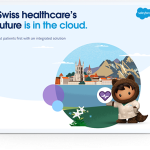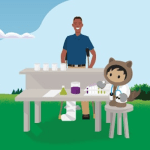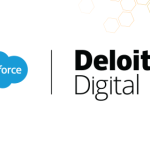The rise of the tech-savvy, data-driven consumer has caused a revolution in the consumer health (CH) industry. Traditionally, customers engaged with consumer healthcare companies primarily when they were unwell, but now – encouraged by new technologies that track everything from steps to sleep stages – they favour a more proactive approach. Empowered, informed, and armed with personalised data, customers everywhere are taking control of their healthcare and wellness journeys.
As a result, CH is enjoying rapid growth, and with new wellness technologies emerging all the time, it looks set to expand even further.
Meanwhile, online businesses like Amazon have disrupted retail, and have raised customers’ expectations for service, speed, and fulfilment to sky-high levels. This means that there’s no time to lose when it comes to digital transformation. Investing in seamless digital solutions is vital if consumer health companies are to engage successfully with customers.
Companies that fall behind risk losing out on a huge scale. Direct-to-consumer (D2C) commerce is accelerating, and e-commerce is CH’s fastest-growing distribution channel, making up 12% of CH’s business – a 59% increase over the past 5 years. As consumers increasingly turn to online channels first when shopping for healthcare products, consumer health companies must ensure that their digital presence is up to scratch, and can provide the high-quality, transparent service that today’s customers demand.
Here are 4 key areas for digital transformation in the consumer health industry:
1. Different ways of engaging your customers
Today’s B2B buyer brings with them a digital-first mentality, along with high expectations of service.
- Only 10% of B2B buyers currently purchase online, but 46% would do so if the option were available, and met their needs.
- According to a McKinsey survey, 76% of buyers want the prompt attention and expertise of a salesperson when purchasing for the first time.
- When making repeat purchases, buyers prefer self-service options; the use of suppliers’ mobile apps has more than doubled since 2019.
Use Salesforce to personalise the B2B journey
Salesforce supports businesses through the entire B2B sales cycle, from lead creation to payment and invoicing, repeat purchasing, and relationship management.
See how Essilor uses Salesforce to personalise their relationship with 10,000 French opticians
2. Different ways of engaging your consumers
Sizeable opportunities remain in this area, and the fastest-growing distribution channel is e-commerce.
- Amazon’s brands are top disruptors in areas such as household goods, but in areas where consumers are more brand-conscious – such as CH – traditional brands have the edge.
- To stay competitive, consumer healthcare companies must leverage their brand loyalty and build solid customer relationships.
How Salesforce can help to drive consumer engagement & D2C
To grow your audience, you have to know them. Salesforce allows companies to build personalised, 1-to-1 consumer journeys using AI-powered insights and Marketing Cloud. Delivering hyper-relevant messaging and seamless support throughout the consumer journey turns buyers into brand advocates.
See how L’Oréal is leveraging Salesforce Marketing Cloud to get closer to consumers.
3: Partnering with customers to drive sell-out
Digital innovations are changing the in-store experience, and consumers have high expectations for service and execution.
- Consumer health companies need to partner with retailers to create bespoke digital experiences. Products must be in the right place at the right time, supported by impeccable customer service.
- By integrating online and in-store data, consumer health companies can unlock seamless omnichannel engagement.
Use Salesforce to partner with retailers for effective promotions
Salesforce enables companies to work with retailers to run more effective promotions and create continuous, personalised member experiences.
To learn more about how Salesforce can help boost consumer health companies, check how to optimise retail execution with CG Cloud.
See how UPSA is using Salesforce to enhance partnerships with 22,000 pharmacies in France.
4. Consumer-driven product innovation
The number of consumers using apps to track health data or engage with healthcare providers has more than doubled since 2014. These knowledgeable, engaged customers are perfectly placed to help consumer health companies hone their offerings.
CH companies can use online portals or mobile apps to engage with consumers, get insights, and recommend products.
See how Lilly is creating personalised experiences with the help of innovative apps and the Salesforce platform.























